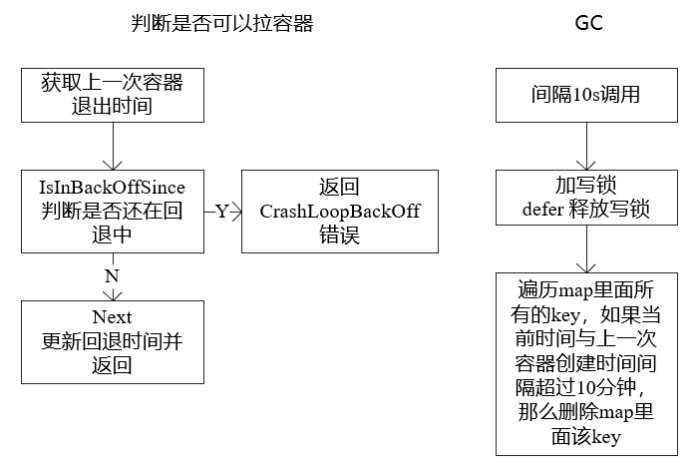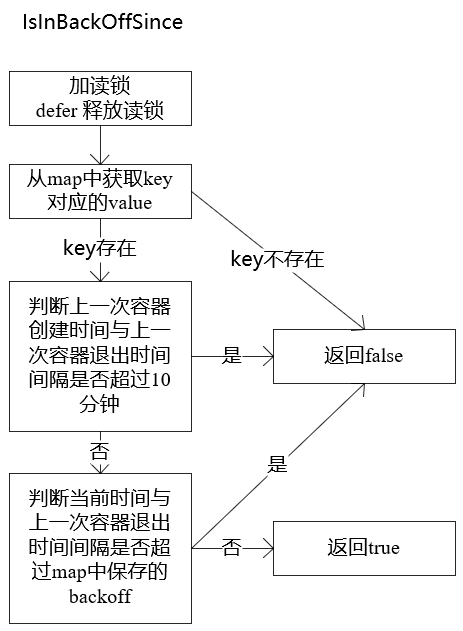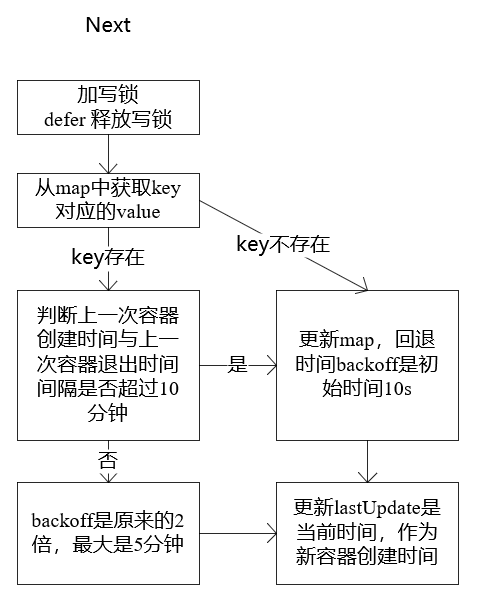容器拉起流程
为了避免容器频繁拉起,kubelet通过backoff来限制(backoff表示上次容器退出时间与再次创建间隔时间,lastUpdate表示上次容器创建时间,backoff和lastUpdate只会在Next函数中会更新):
Pod中重启容器时(周期性执行SyncPod函数),Pod通过自身的Status找到当前容器上一次退出时间,记为t。
如果是第一次重启,那么直接重启容器,记录下次backoff的时间(初始值为10s,然后不断*2,最大5min),更新lastUpdate(当前时间)。
如果不是第一次重启,如果now() - t < backoff,那么说明等待时间不够,抛出CrashLoopBackOff错误(等到下一个SyncPod,重新比较这个值);否则,说明已经等待backoff时间了,执行backOff.Next(),更新backoff和lastUpdate,创建新容器。
如果lastUpdate与上一次容器退出时间间隔超过10分钟,那么把backoff重置为10s,更新lastUpdate。
源码位置
staging/src/k8s.io/client-go/util/flowcontrol/backoff.go
/*
Copyright 2015 The Kubernetes Authors.
Licensed under the Apache License, Version 2.0 (the "License");
you may not use this file except in compliance with the License.
You may obtain a copy of the License at
http://www.apache.org/licenses/LICENSE-2.0
Unless required by applicable law or agreed to in writing, software
distributed under the License is distributed on an "AS IS" BASIS,
WITHOUT WARRANTIES OR CONDITIONS OF ANY KIND, either express or implied.
See the License for the specific language governing permissions and
limitations under the License.
*/
package flowcontrol
import (
"sync"
"time"
"k8s.io/apimachinery/pkg/util/clock"
"k8s.io/utils/integer"
)
type backoffEntry struct {
backoff time.Duration
lastUpdate time.Time
}
type Backoff struct {
sync.Mutex
Clock clock.Clock
defaultDuration time.Duration
maxDuration time.Duration
perItemBackoff map[string]*backoffEntry
}
func NewFakeBackOff(initial, max time.Duration, tc *clock.FakeClock) *Backoff {
return &Backoff{
perItemBackoff: map[string]*backoffEntry{},
Clock: tc,
defaultDuration: initial,
maxDuration: max,
}
}
func NewBackOff(initial, max time.Duration) *Backoff {
return &Backoff{
perItemBackoff: map[string]*backoffEntry{},
Clock: clock.RealClock{},
defaultDuration: initial,
maxDuration: max,
}
}
// Get the current backoff Duration
func (p *Backoff) Get(id string) time.Duration {
p.Lock()
defer p.Unlock()
var delay time.Duration
entry, ok := p.perItemBackoff[id]
if ok {
delay = entry.backoff
}
return delay
}
// move backoff to the next mark, capping at maxDuration
func (p *Backoff) Next(id string, eventTime time.Time) {
p.Lock()
defer p.Unlock()
entry, ok := p.perItemBackoff[id]
if !ok || hasExpired(eventTime, entry.lastUpdate, p.maxDuration) {
entry = p.initEntryUnsafe(id)
} else {
delay := entry.backoff * 2 // exponential
entry.backoff = time.Duration(integer.Int64Min(int64(delay), int64(p.maxDuration)))
}
entry.lastUpdate = p.Clock.Now()
}
// Reset forces clearing of all backoff data for a given key.
func (p *Backoff) Reset(id string) {
p.Lock()
defer p.Unlock()
delete(p.perItemBackoff, id)
}
// Returns True if the elapsed time since eventTime is smaller than the current backoff window
func (p *Backoff) IsInBackOffSince(id string, eventTime time.Time) bool {
p.Lock()
defer p.Unlock()
entry, ok := p.perItemBackoff[id]
if !ok {
return false
}
if hasExpired(eventTime, entry.lastUpdate, p.maxDuration) {
return false
}
return p.Clock.Since(eventTime) < entry.backoff
}
// Returns True if time since lastupdate is less than the current backoff window.
func (p *Backoff) IsInBackOffSinceUpdate(id string, eventTime time.Time) bool {
p.Lock()
defer p.Unlock()
entry, ok := p.perItemBackoff[id]
if !ok {
return false
}
if hasExpired(eventTime, entry.lastUpdate, p.maxDuration) {
return false
}
return eventTime.Sub(entry.lastUpdate) < entry.backoff
}
// Garbage collect records that have aged past maxDuration. Backoff users are expected
// to invoke this periodically.
func (p *Backoff) GC() {
p.Lock()
defer p.Unlock()
now := p.Clock.Now()
for id, entry := range p.perItemBackoff {
if now.Sub(entry.lastUpdate) > p.maxDuration*2 {
// GC when entry has not been updated for 2*maxDuration
delete(p.perItemBackoff, id)
}
}
}
func (p *Backoff) DeleteEntry(id string) {
p.Lock()
defer p.Unlock()
delete(p.perItemBackoff, id)
}
// Take a lock on *Backoff, before calling initEntryUnsafe
func (p *Backoff) initEntryUnsafe(id string) *backoffEntry {
entry := &backoffEntry{backoff: p.defaultDuration}
p.perItemBackoff[id] = entry
return entry
}
// After 2*maxDuration we restart the backoff factor to the beginning
func hasExpired(eventTime time.Time, lastUpdate time.Time, maxDuration time.Duration) bool {
return eventTime.Sub(lastUpdate) > maxDuration*2 // consider stable if it's ok for twice the maxDuration
}SyncPod调用回退模块流程图

回退模块流程
判断是否还在回退中

更新backoff和lastupdate

总结
